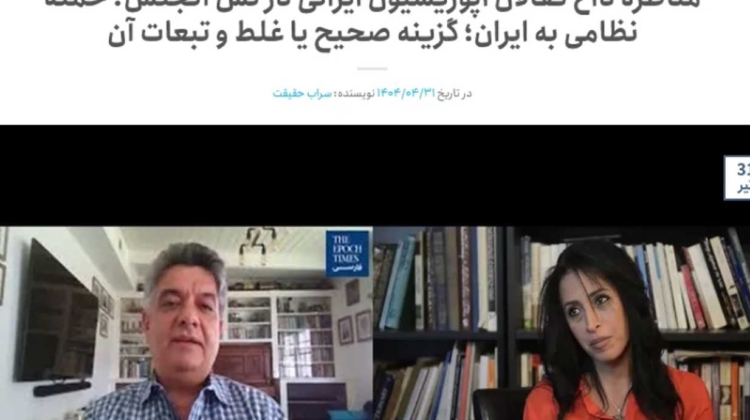
|
Getting your Trinity Audio player ready...
|
[Want even more content from FPM? Sign up for FPM+ to unlock exclusive series, virtual town-halls with our authors, and more—now for just $3.99/month. Click here to sign up.]
Congratulations to Dr. Jamie Glazov and The Glazov Gang.
It’s an honor to serve alongside him as a fellow truth-teller. For over a decade, Jamie has fearlessly exposed the lies of jihadist ideology, totalitarian regimes, and their enablers in the West.
It means we’re effective. It means the truth is getting through. And it means they’re afraid.
When You Make the Mullahs Mad, You Know You’re Doing Something Right
As the producer of The Glazov Gang, I’ve watched my mentor, Dr. Jamie Glazov, spend the last 13 years telling the truth about Islam and earning the title “Islamophobic historian” from all the right enemies.
Well, it finally happened: we just triggered an Iranian .IR site based inside the Islamic Republic. Sarabehaghighat.ir, a regime-friendly outlet focused on attacking religious dissent, published a whole write-up about one of our debates—between Elham Yaghoubi and Roozbeh Farahani-Pour—calling out our “Islamophobia” and trying to frame the conversation as divisive.
That means they’re watching. And they’re bothered.
Below is the full word-for-word English translation of their article.
Enjoy!
*
Fiery Debate Between Iranian Opposition Activists in Los Angeles: Military Attack on Iran—Right or Wrong and Its Consequences Following the recent “12-day war” between Iran and the Zionist regime, a debate was recently held in Los Angeles hosted by the program The Glazov Gang, run by Jamie Glazov (a historian and editor known for Islamophobia), between two Iranian activists:Elham Yaghoubi (an Iranian-Jewish activist who supports a military attack on Iran) and Roozbeh Farahani-Pour (an opposition activist who opposes such an attack).
War Over “Infrastructure”: Tools of Repression or National Assets? The central focus of the debate was how to define the “infrastructure” being targeted.Elham Yaghoubi considered the attacks by the Zionist regime to be not against national infrastructure, but against “Islamic Republic infrastructure”—which she described as including “IRGC and Basij command centers and all repression and terrorist centers.”
She emphasized that these are “tools of repression against the Iranian people” and their destruction is “a golden opportunity” for change.
She even called this conflict “a war between two foreign powers,” in which one side (Israel) is more aligned with the goals of the Iranian people.
In contrast, Roozbeh Farahani-Pour opposed the destruction of these facilities, arguing that even if they are currently used by the regime, they could be useful for “post-Islamic Republic Iran.”
He pointed out that “millions upon millions of dollars” from the public’s pockets had been spent to build these bases—now wasted.
Civilian Casualties and Fear of Disintegration Regarding civilian casualties, both sides acknowledged the lack of accurate information due to alleged censorship in Iran.Yaghoubi warned against falling into the “regime’s disinformation trap” and cast doubt on government-issued statistics.
But Farahani-Pour, while also questioning the accuracy of those numbers, referred to eyewitness reports of civilian targets being hit—ranging “from Tajrish Square to Evin Prison and hospitals.”
The debate over the threat of Iran’s disintegration was another major flashpoint.
Elham Yaghoubi firmly rejected comparisons to Iraq and Afghanistan, arguing that Iran has a “2,500-year-old historical root and culture” and “a much deeper national identity,” which would prevent its breakup.
On the other hand, Roozbeh Farahani-Pour called the threat of Iran’s fragmentation “very serious.”
He cited historical disintegrations and the “vast expanse of ancient Iran,” describing today’s Iran as “a small cat” that is now in danger. He also pointed to the role of some foreign countries in supporting separatist organizations.
Role of the Opposition and Reza Pahlavi’s Position Roozbeh Farahani-Pour also harshly criticized Reza Pahlavi’s stance during the “12-day war.”He claimed Pahlavi called on “air defense forces to remove their uniforms and join the movement,” and told “pilots to refuse flying”—which, according to Farahani-Pour, amounted to “supporting the war.”
He argued that the opposition’s role is to “weaken the foundations of dictatorship,” not push people to support it.
This debate reflected the deep divisions and challenges among Iranian opposition activists abroad, who are divided over how to confront the Islamic Republic regime.
*
Subscribe to the Glazov Gang’s Newsletter.


If Jamie and friends WEREN’T triggering Islamic Media they wouldn’t be doing their job 😉